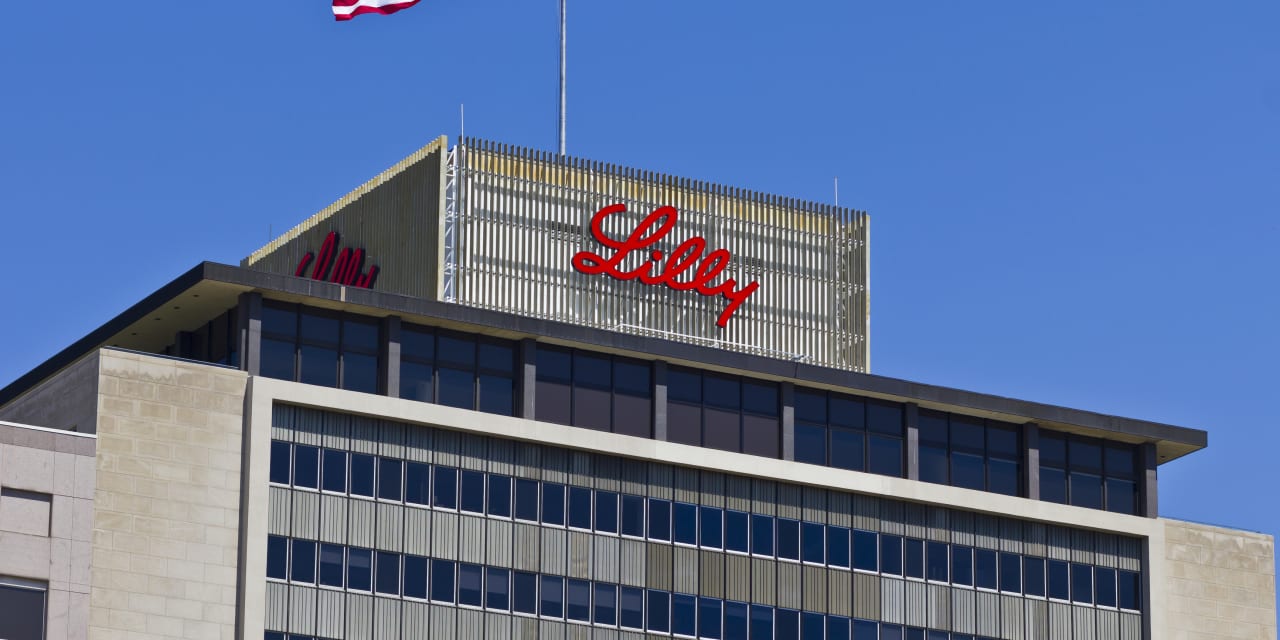Eli Lilly
shares jumped again on Tuesday, as signs continue to point to the drug maker’s new obesity and diabetes medicines growing into earthshaking blockbusters.
Lilly reported fourth-quarter financial results Tuesday, including quarterly sales of its diabetes medicine Mounjaro of $2.1 billion, above the $1.7 billion FactSet consensus estimate
Sales of Zepbound, the obesity medicine that only hit U.S. pharmacies in December, were $175.8 million in less than a month, above the $75 million consensus estimate.
Lilly also reported positive results in a Phase 2 study of the medicine used in Mounjaro and Zepbound in patients with a common liver condition known as nonalcoholic steatohepatitis. In a note out Tuesday, Raymond James analyst Steven Seedhouse called the results the best any drug for the condition has ever shown in Phase 2 or Phase 3 trials. That early data are good news for Lilly, and could potentially be used to expand the market for the medicine if insurers continue to balk at paying for obesity drugs.
Lilly’s non-GAAP earnings per share in the fourth quarter were $2.49, well above the consensus estimate for $2.30. Total revenue for the quarter was $9.4 billion, beating the $8.9 billion estimate.
The company laid out guidance for the year that is roughly in-line with analyst expectations. Lilly said it expects to have revenue of $40.4 billion to $41.6 billion in 2024, and non-GAAP earnings per share of $12.20 to $12.70. Analysts had expected sales of $39.2 billion and earnings per share of $12.39.
Lilly shares jumped 2.5% early Tuesday to $723.86, while the
S&P 500
index was about flat.
The stock has been on a tear lately, due largely to excitement over the sales potential of Zepbound and Mounjaro. Shares are up 24% so far in 2024, and up 113% over the past 12 months.
Lilly stock’s trajectory has been starkly different than those of large pharmaceutical peers, many of which reported earnings last week. Shares of companies such as
Pfizer
are seeking to recover after a dismal performance in 2023 as they face swaths of patent expirations.
According to FactSet, analysts expect Lilly’s earnings to begin to explode this year, climbing to $30.26 per share in 2028.
Both Lilly and competitor
Novo Nordisk,
which makes Ozempic and Wegovy, have flagged manufacturing capacity for the weight-loss and diabetes medicines as issues. On Monday, Novo announced an $11 billion plan to acquire three facilities used in its manufacturing process as part of a larger $16.5 billion deal by which Novo’s controlling shareholder plans to acquire the contract manufacturer
Catalent.
In a press release on Tuesday morning, Lilly said that demand for the new medicines “is likely to outpace supply in 2024.”
Asked at a January investor conference when capacity would no longer be “the rate limiter” for drugs of Zepbound’s category, Lilly CEO David Ricks said, “not anytime soon.”
“I don’t say that in a negative way,” Ricks added. “I think that speaks to the incredible opportunity here.”
Lilly is seeking coverage of Zepbound from insurers, which poses a significant challenge given the potential costs involved. In January, Lilly said it opposed the use of Mounjaro and Zepbound for “cosmetic weight loss.” Lilly said Tuesday that 90% of U.S. patients with Type 2 diabetes on commercial and Medicare Part D plans have access to Mounjaro. Access for Zepbound is much more limited, though still potentially higher than might have been expected: The company said that “approximately 1/3” of patients on commercial insurance have access to Zepbound.
Regarding patients with the liver disease NASH given tirzepatide, the medicine used in Zepbound and Mounjaro, Lilly said that 74% had no worsening of liver fibrosis after 52 weeks, compared to 13% of patients on placebo. Biotechs and big pharma companies alike have spent years seeking to make treatments for NASH, with very little success.
Write to Josh Nathan-Kazis at [email protected]
Read the full article here




